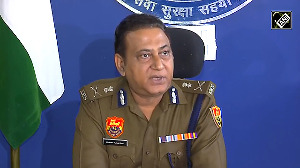The Maharashtra government has admitted that the use of Prevention of Terrorism Act against 25 accused in two cases of violence in Solapur in August 2002 was wrong.
Four of the accused were charged in both cases.
The government has now withdrawn the charges against all the 25 accused under the anti-terror act and booked them under sections 4, 5 and 6 of the Indian Explosives Act.
Solapur is the parliamentary constituency of Chief Minister Sushilkumar Shinde.
In the first case, the police had found country-made (sutli) bombs in a garbage bin in the city. In the second, it had recovered knives and country-made bombs from one the accused's house.
Sixteen people were booked in the first case and 13 in the second under section 3 (possessing explosive material) and section 5 (helping the person who possess explosive material) of POTA.
The police, however, managed to arrest only 20 of them. Four of the accused -- Abdul Mulla, Farooq Tabiq, Anwar Gulam, Yakub Saudagar -- were booked in both the cases.
Principal Secretary (Home) P K B Chakravorty told rediff.com: "Under POTA there is a provision that the police have to take the government's permission before filing the charge sheet. The government found that the Solapur cases were not fit for POTA. So POTA charges were dropped."
Surprisingly, no action is proposed against the policemen for using POTA where it was not required.
"It is the government's jurisdiction to take final decision on such cases," Chakravorty said.
Bharatiya Janata Party's Solapur unit president, Kishore Deshpande, said cases were serious enough to attract charges under POTA.
"Due to communal riots in Solapur in 2002 the presence of these explosives was considered very serious. Some of the accused have links with political parties, while others are members of various community organisations affiliated to the Congress party. Since it is election time, POTA charges have been withdrawn," he alleged.
Soon after POTA came into effect, the Maharashtra government had formed a committee headed by the then additional chief secretary (home) U K Mukhopadhyay to review all cases in which the anti-terror law was applied.
The Mumbai police commissioner, state director general of police and the law secretary were part of the committee. On January 30, 2004 the committee had met to discuss six POTA cases -- four related to Mumbai bomb blasts and the two Solapur cases.
Chakravorty told rediff.com: "The committee found that the imposition of POTA against 15 accused in four different Mumbai bomb blast cases was warranted and recommended to government to prosecute them under the act. But in two Solapur cases the committee found that the arrested people had only knives and country-made bombs. The committee decided that these cases were not fit for POTA and recommended the government to drop the charges against them."
Acting on the committee report the state government ordered the Solapur police to drop POTA charges against all 25 accused. But they will be tried under sections 4,5 and 6 of Indian Explosives Act.
Maharashtra Home Minister R R Patil told rediff.com: "In these (Solapur) cases POTA was misused. We had appointed committee on central government's directive to review the POTA cases as the investigating officers have more power under POTA. I don't think that there is any political motive behind the dropping of charges."






 © 2025
© 2025